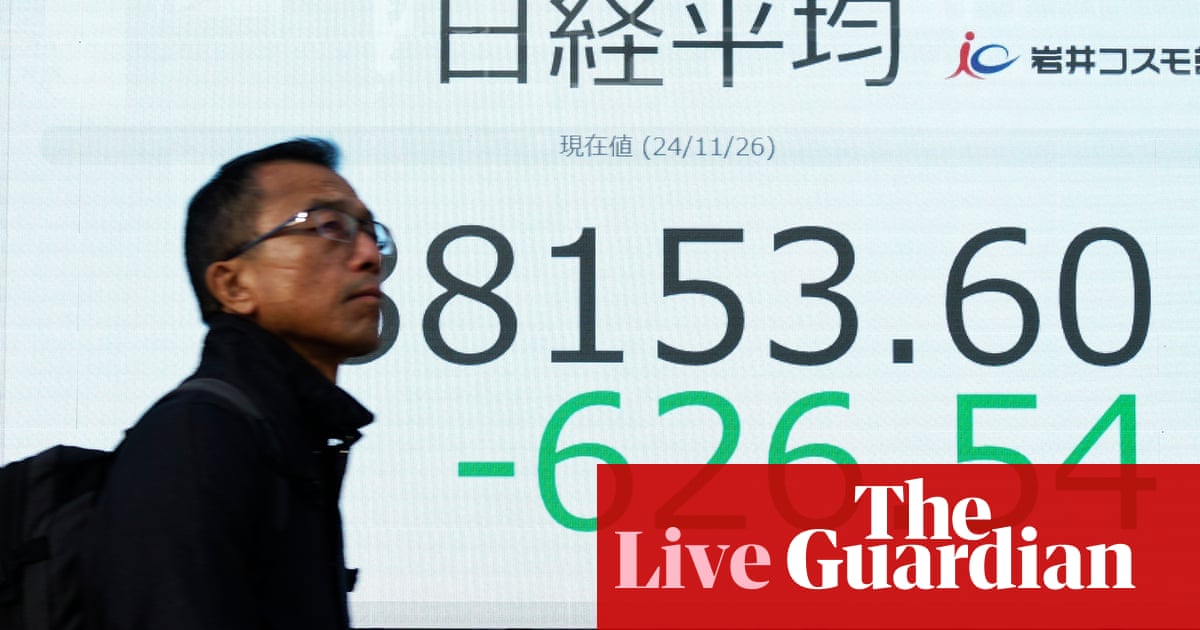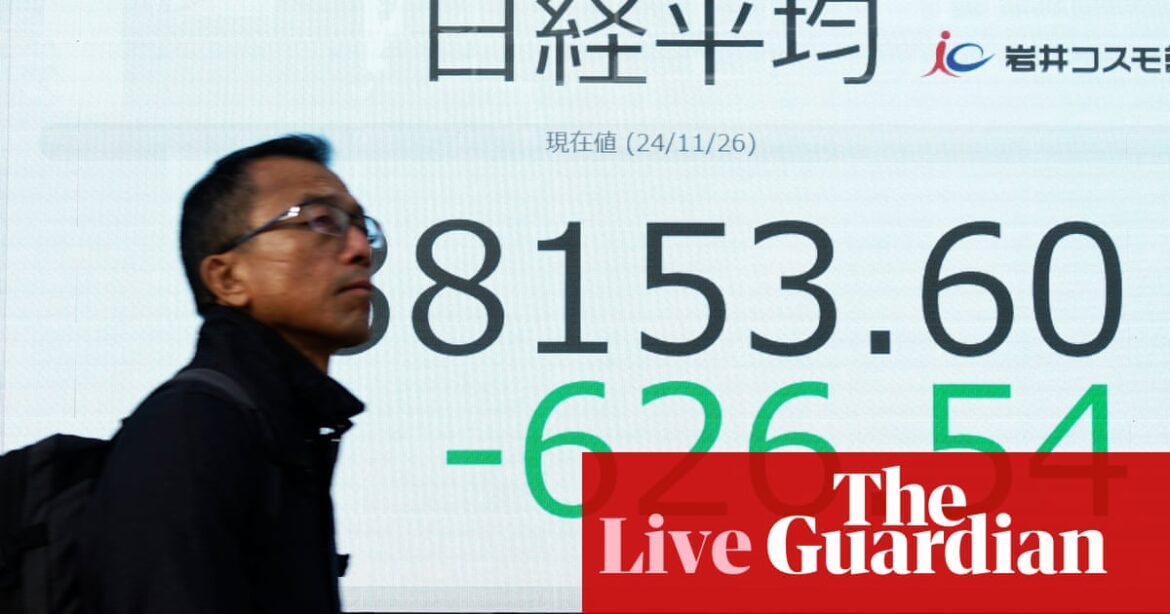
Trump declared on Monday evening that he would impose 25% tariffs on all goods from Canada and Mexico, and an additional 10% on China, if they did not stop what he claimed was illegal immigration and fentanyl smuggling.
But although he has called tariffs the most “beautiful word in the dictionary”, about 69% of Americans think tariffs on imports will lead to higher prices, according to the poll.
The majority of Democrats (79%), independents (68%) and Republicans (59%) all believe that tariffs will increase the prices of the goods they pay for in the US. Nearly the same percentage of respondents said that tariffs will have a significant effect on what they can afford.
The poll chimes with reseaarch by ING published on Tuesday which predicts that the US president-elect’s 25% tariff on products from Mexico and Canada, and 10% on China, could cost US consumers $2,400 a year.
slap a 25% tariff on products from Canada and Mexico, and 10% on goods coming from China.
Shares in companies with signifcant operational links to the nations in Trump’s line of fire were the hardest hit, such as automotive firms and alcohol producers.
While in general markets in Europe and Asia were hit over fears that Trump could target more countries and spark a potential global trade war.
The announcement, made on Trump’s Truth Social platform, saw the dollar jump 1.5% against the Mexican Peso, 1% against the Canadian dollar and hit a four-month high against the Chinese Yuan.
Economists at IMG have estimated that if the full cost of the tariffs are passed on to consumers, then Americans will face having to pay $2,4000 more per capital annually for goods.
An exclusive poll for the Guardian found that consumers agree, with two-thirds of Americans polled saying that they think Trump’s tariffs will mean higher prices.
John Roberts, the boss of British online electrical goods seller AO.com, has said that if the tariffs on Chinese goods are implemented it could mean lower prices on electricals in the UK.
“Fundamentally if less product is being made in China and shipped to the US then they will want to find another home for that output which might reduce prices for us,” Roberts said.
Meanwhile, optimism amongst British retailers has hit a two-year low off the back of expectations of gloomy Christmas sales, and the prospect of the increase in Employers’ National Insurance contributions next April, according to the latest quarterly survey by the Confederation of British Industry (CBI).
And, the British government is expected to stick to headline targets for increasing electric car sales each year, but will consider adding extra loopholes to help carmakers, after a barrage of lobbying by the car industry.
Keir Starmer’s spokesperson on Tuesday announced that the government will bring forward the consultation on the zero-emission vehicle (ZEV) mandate which will look at changes to the rules which impose fines of up to £15,000 per petrol or diesel vehicle sold above a quota.
Carmakers have privately warned that they will miss the targets, forcing them to stump up millions of pounds to buy “credits” from rivals, or else pay the fines.
government is listening to their concerns, at a dinner this evening hosted by the Society of Motor Manufacturers and Traders (SMMT), a lobby group.
The government is likely to stick firmly to its goal of phasing out new petrol and diesel car sales from 2030, and all hybrids by 2035, according to a person with knowledge of internal discussions.
The person said the government is also very likely to stick to headline targets which mandate that sales of electric cars must account for 22% of new sales in 2024 for each manufacturer, rising to 28% next year and 80% by 2030, despite reports they could change.
However, the government will consider changes to “flexibilities” that effectively allow carmakers to reduce the number of electric cars that they need to sell.
Those loopholes include the ability to “over-comply” in later years to make up for a slow start in the coming two or three years, and lowering the average emissions of the fossil fuel cars they sell.
The “fast-track” consultation is expected to launch before Christmas, before reporting back in the first few months in 2025 – faster than most policy consultations of that type. It is also expected to include details of which hybrid cars can continue to be sold after 2030.
The expected changes to the ZEV mandate would come despite opposition from charger companies, fleet owners and environmental campaigners, who argue that delays will hit investment and imperil emissions targets.
Dan Caesar, chief executive of Electric Vehicles UK, a pro-battery car campaign group, said:
The ZEV mandate is world-leading legislation that will put the UK firmly on the map with green tech investors and send a clear signal that the country means business when it comes to the global energy transition. Clean air and sustainable employment are surely the legacy we all want, and the existing zero emissions mechanisms is critical.
even countries with existing agreements with the US can be subject to tariffs.
2. Right after the Treasury Secretary announcement
Tariffs are being announced just a few hours after the nomination of Scott Bessent as Treasury Secretary. This is pushback to the argument that tariffs are taking a backseat to the Trump agenda.
3. The tariffs cover 40% of total US trade
While only limited to three countries, the impact is economically large at it applies to America’s three largest trading partners after the Euro-area.
4. Presidential authority, for now
It is explicitly mentioned that executive authority will be used to impose these tariffs rather than the legislative route. We suspect that the most likely avenue will the International Economic Emergency Powers Act (IEEPA).
5. Tactical and transactional, for now
The announcement is only targeted at three countries and leaves the prospect of tariff removal open. There is no mention of tariffs as a strategic tool to deal with trade imbalances or as a revenue-raiser.
The optimistic take is that this means that some of the most extreme scenarios under universal tariffs will not happen. The pessimistic interpretation (which we favour) is that this is an opening salvo and the targeted focus on immigration and drugs is required to trigger broad-based executive authority under the IEEPA.
6. Watch the China legislation in Congress
Just last week a new bill was submitted to the Senate removing permanent trade relations with China and targeting 50%-100% tariffs. There is already a similar bill in the US House of Representatives. For us, whether the tariff discussion turns strategic via legislation is a big outstanding question to be resolved.
7. Beware complex supply chains
EUR/USD is reacting with relief that no mention of European trade was made. But note for example that German car manufacturers have huge production capacity in Mexico that is then on-sold to the US. Also note the complex inter-play of Chinese and Mexico trade which makes the negative impact of tariffs on Mexico even bigger.
8. Canada most under-priced
The Canadian dollar has had the largest risk-adjusted weakening move since the tariffs were announced. Canada is the most vulnerable developed market country to extra tariffs but also the least under-priced in terms of risks.
9. The softer the market reaction, the greater the likelihood of more tariffs
The equity market reaction has so far been very benign, we would argue likely on the back of the transactional interpretation. That US domestic small-caps have been leading the recent market rally also helps reduce the impact.
The first Trump administration showed that the more benign the market reaction, the greater the likelihood of further escalation.
10. Truth Social is the new avenue for announcements
During the first Trump administration, it was Twitter. Market participants need to be watching the President’s new social media platform now.
according to a Harris poll conducted exclusively for the Guardian.
Trump declared on Monday evening that he would impose 25% tariffs on all goods from Canada and Mexico, and an additional 10% on China, if they did not stop what he claimed was illegal immigration and fentanyl smuggling.
But although he has called tariffs the most “beautiful word in the dictionary”, about 69% of Americans think tariffs on imports will lead to higher prices, according to the poll.
The majority of Democrats (79%), independents (68%) and Republicans (59%) all believe that tariffs will increase the prices of the goods they pay for in the US. Nearly the same percentage of respondents said that tariffs will have a significant effect on what they can afford.
The poll chimes with reseaarch by ING published on Tuesday which predicts that the US president-elect’s 25% tariff on products from Mexico and Canada, and 10% on China, could cost US consumers $2,400 a year.
financial performance and environmental track record.
David Black, the chief executive of Ofwat, defended the regulator’s record at a select committee on Tuesday following criticism it allowed water companies to load up on unsutainable amounts of debt, while failing to invest in infrastruture and continuing to spill sewage into rivers and seas.
Asked by committee chair, the Liberal Democrat MP Alistair Carmichael whether these issues show the privatisation model has failed, Black said:
“I wouldn’t agree – it shows the need for strong regulation of the sector. It’s very clear the sector needs to change. That said it’s important to bear in mind the sector has raised over £240bn since privatisation and there has been significant reduction in leakage and there’s more to do. Customer bills since privatisation have increased but we have saved billions of pounds for customers at each price review.”
He added that “we can point to real successes in the model since privatisation.”
The water companies in England were privatised in 1989 and since then they have come under fire for presiding over leakages of tap water, sewage spills and a lack of reservoirs being built meaning the country is at risk of running out of water. The Labour government is currently running a review into the privatised model.
Carmichael asked if the situation with Thames Water, the largest water company in England, which has been at risk of collapse due to its high levels of debt, illustrates an issue with the privatised model.
Black said:
“Thames Water very clearly have issues with their financial structures and we have taken action to make sure customers don’t bear the consequences.
With privatisation we were always very clear that we might see companies fail, that’s why we have the special administration regime, we were always very clear it wasn’t Ofwat’s role to stop companies going bust it is our role to ensure customers are protected when they are unable to meet their obligations but the fact is the sector has raised finance.”
AO.com, said
it was too early to tell if Donald Trump’s administration would
follow through with its threat to slap more tariffs on Chinese goods,
but such a move could mean lower prices on electricals in the UK.
“Fundamentally if less product is being made in China and shipped to the US then they will want to find another home for that output which might reduce
prices for us,” Roberts said.
But he cautioned: “We are a long way from it happening and tariffs biting and the follow through so I personally wouldn’t read too much into [Trump’s
threats].”
“Donald is a deal maker and he is laying the ground for negotiation and he is not going to lay the ground by saying I am not going to put any tariffs. This
is his opening gambit and it was always going to be sensational.”
Roberts made the comments as he warned that UK chancellor Rachel Reeves’ budget would push up prices for UK consumers because it meant more cost for business.
AO said direct and indirect costs would rise £8m, including higher payments for self-employed drivers as well as higher national insurance contributions and the minimum wage rises for employees.
“I’m no economist, I’m a washer flogger from Bolton, but if you
dramatically increase all the costs then prices will go up as night
follows day. They have to.”
He said he was concerned as “inflation hurts the people that can afford it the
least the most.”
“largest deportation operation in American history” – there could be a 1% increase in inflation in the US.
James Knightley, ING chief international economist for the US, said:
“President-elect Donald Trump has promised to implement sweeping new tariffs aimed at protecting American industries, promoting domestic manufacturing, and reducing reliance on foreign imports.
“However, tariffs imposed during the first Trump term – and continued and extended under Biden – did not achieve all of the promised outcomes. Furthermore, our research shows that if the new tariffs are fully passed on, they could increase inflation and cost American consumers up to $2,400 per capita annually.
The report points to policies implemented under the first Trump administration, such as a 20% tariff on all imported large residential washing machines introduced in 2018, which resulted in the retail cost climbing 12%.
£23m hit from tax rises in the budget this morning, Compass Group, Europe’s biggest catering company, talks about the “opportunity rather than threats” this brings to its business.
Dominic Blakemore, the Compass chief executive, told analysts and investors that the “cost and complexity” of the increase in national insurance contributions for employers will pile pressure on many UK companies, and may prompt them to outsource catering to save money.
“The NIC rate increase increases cost for everyone. We see an opportunity in first-time outsourcing.”
He argues that Compass, given its size and presence in other countries, can manage those cost rises more efficiently. The company employs 55,000 people in the UK, and 580,000 globally.
His comments came as the catering group reported a 10% rise in revenues to $42bn in the year to 30 September, while underlying profit before tax rose to $2.7bn from $2.4bn.
which also has operations in Mexico, was the biggest faller down 2.5%.
Meanwhile, Campari fell 2.3%, Remy Cointreau slid almost 2%, Pernod Ricard fell 1.7% and Carlsberg dropped by just over 1%.
Kathleen Brooks, research director at XTB, said that European stocks are a “sea of red” this morning following Trump’s policy-by-social media announcement.
She pointed out that London’s FTSE 100 has proved to be the most resilient of the European markets as the UK is “expected to be shielded from the worst of Trump’s tariff plans”.
Mohit Kumar, in the global economics team at Jefferies, sees the move by Trump as an “opening move for negotiations” given he has threatened that tariffs on Chinese imports could go up to 60%.
Our view remains that tariffs will eventually not end up as bad as feared, but we will see increased uncertainty over the coming months. Waking up to check the tweets for any policy announcements could become the norm. Tariffs will further support the view of US over rest of the world from an investment perspective.
brands including Fiat, Chrysler, Peugeot and Vauxhall, have been hit the hardest falling almost 6% in early trading.
Germany’s Volkswagen fell 2.7%, Mercedes-Benz tumbled 2.2%, BMW dropped 2.4%, and luxury brand Porsche fell 2.3%.
Marc Ostwald, chief economist and global strategist at ADM Investor Services, said that markets will have to “reattune” to Trump’s “frequently erratic” approach to policymaking.
Trump’s promise overnight to implement tariffs immediately on taking office in January were no great surprise, though the fact that he is taking initial aim at Mexico and Canada as much as China may have surprised some, though it is in line with his narrative during the election.
Still it serves as a reminder that markets will have to reattune themselves to his frequently erratic approach to policymaking, and his likely hefty reliance on executive orders where possible to circumvent the legislature.
impose additional tariffs on products coming into the US from China, Mexico and Canada.
Posting on his social media site Truth Social, Trump said that when he becomes president on January 20th he will “sign all necessary documents to charge Mexico and Canada a 25% Tariff on ALL products coming into the United States, and its ridiculous Open Borders.”
The levy on products from Mexico and Canada – and 10% on Chinese imports – saw the dollar rise almost 2% against the Mexican peso and hit a four and a half year high against the Canadian dollar.
The US currency also rose to its highest level since July against China’s yuan as markets reacted to Trump’s comments.
Most Asian equities declined with share benchmarks in Japan, Australia and South Korea all dropping.
The news on tariffs reversed a 0.6% fall in the dollar index on Monday, following Trump’s nomination of hedge fund manager Scott Bessent as Treasury secretary, an appointment investors took as a sign that the president-elect’s policies may be moderated.
Stephen Innes, managing partner, SPI Asset Manager, said:
In a striking return to hardline policies, President-elect Trump has dramatically escalated tensions with a brash promise to impose a sweeping 25% tariff on all imports from Canada and Mexico the moment he reassumes office. This bold declaration shatters any lingering hopes that the new Treasury Secretary, Scott Bessent, might usher in an era of moderation. Initially hailed as a beacon of stability, Bessent’s influence now seems overshadowed by a resurgence of Trump’s uncompromising “America First” doctrine, which starkly excludes even the closest of allies from its protective embrace.
The agenda
-
9am: FCA to release consumer research on crypto assets, and its crypto ‘roadmap’
-
10.00am: The EFRA Committee will hold an evidence session to scrutinise the work of Ofwat
-
11.15am: UK Treasury minister expected to speak at TheCityUK National Conference in Birmingham
-
2:30pm: Business and Trade select committee session with UK business secretary Jonathan Reynolds
Source: theguardian.com



